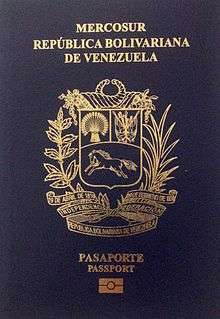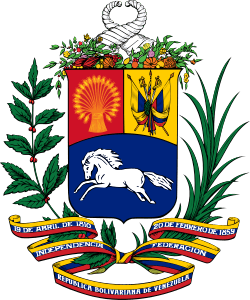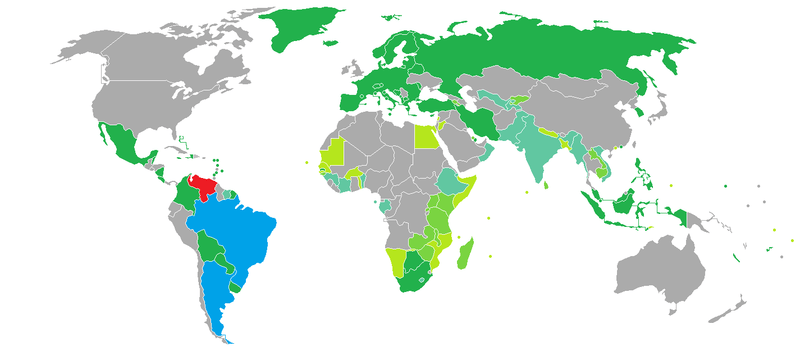Venezuelan passport
Venezuelan passports are issued to citizens of Venezuela to travel outside the country. Biometric passports have been issued since July 2007, with a RFID chip containing a picture and fingerprints; passports issued earlier remained valid until they expired.
| Venezuelan passport | |
|---|---|
 The current front cover of the Venezuelan biometric passport. | |
| Type | Passport |
| Issued by | |
| First issued | 1 July 2007 (first biometric version) 17 April 2015 (second biometric version) |
| Purpose | Identification |
| Eligibility | Venezuelan citizenship |
| Expiration | 5 years |
 |
|---|
| This article is part of a series on the politics and government of Venezuela |
|
Executive
|
|
Legislature
|
|
Judiciary |
|
|
|
|
As of 2015 passports were 34 pages long and displayed a biometric symbol on the bottom of the cover. The cover is deep blue and shows the name Mercosur followed by "República Bolivariana de Venezuela" on the top.
The holder's personal information is written in a digital format on a plastic card which also bears a machine-readable zone on the bottom, and a picture of the holder on the left.
Starting from 5 November 2018, all new passport applications will be paid using the Petro, a cryptocurrency established by the Venezuelan government with the backing of oil, gasoline, gold, and diamond reserves.[1][2] The cost of a new passport will cost 2 petros ($120 USD [3]) or Bs.S 72,000.[4]
Due to the difficulty to obtain a new passport in Venezuela, the United States,[5] Canada,[6] Spain[7] and several Latin American countries[8] accept the use expired Venezuelan passports up to five years.
Controversies
Allegations of fraud

On 8 February 2017, a joint CNN and CNN en Español investigation called "Passports in the Shadows" (Spanish: Pasaportes en la sombra) - based on the information provided by a whistleblower and subsequent investigations, reported that employees of the Venezuelan embassy in Baghdad, Iraq has been selling passports and visas to persons from Middle Eastern countries (specifically Syria, Palestine, Iran, Iraq and Pakistan) with dubious backgrounds for profits, including to members of the Lebanese group Hezbollah.
The Venezuelan immigration department, SAIME, confirmed the sold passports' genuineness as each passport came with an assigned national identification number, although the names of these individuals were altered when checking against the national database. At least one individual's place of birth was also changed from Iraq to Venezuela. According to Misael López Soto, a former employee at the Venezuelan embassy in Iraq who was also a lawyer and CICPC officer, the Bolivarian government would sell authentic passports to individuals from the Middle East, with the Venezuelan passport able to access 130 countries throughout the world without a visa requirement. López provided CNN documents showing how his superiors attempted to cover up the sale of passports, which were being sold from $5,000 to $15,000 per passport. López Soto fled the Venezuelan embassy in Iraq in 2015 to meet with the FBI in Spain, with a Venezuelan official who assisted him to fly out of the country being killed the same day. The investigation also found that between 2008 and 2012, Tareck El Aissami ordered for hundreds of Middle Eastern individuals to obtain illegal passports, including members of Hezbollah.[9][10]
The Venezuelan foreign minister, Delcy Rodriguez, denied the government's involvement when questioned by the reporters during the Seventy-first session of the United Nations General Assembly and accused the network of performing what she described as an "imperialistic media operation" against Venezuela for airing the year-long fraud investigation.[11]
On 14 February 2017, Venezuelan authorities ceased the broadcasting of CNN en Español two days after the Venezuelan president, Nicolas Maduro, ordered CNN to "(get) well away from here".[12][13] The government deemed the report "(A threat to) the peace and democratic stability of our Venezuelan people since they generate an environment of intolerance."[14]
In addition, CNN en Español has been also accused of instigating religious, racial and political hatred, violence and other themes, according to the Venezuelan National Commission of Telecommunications director Andres Eloy Mendez.[15][16]
Material shortages
In March 2017, it was reported that SAIME lacks enough "materials" to cope with demands for passports. As a result, only approximately 300,000 passports were issued in 2016 while between 1.8 million and 3 million Venezuelans applied for passports. SAIME launched an online platform for applications while guaranteeing 72-hour delivery with doubled fees. The site has crashed numerous times since its launch.[17][18] Those outside Venezuela were solicited bribes usually many times of the cost of the passport.[19][20]
Due to these shortages, the Maduro government has since 1 November 2017 allowed Venezuelan passport holders to extend their passports by 2 years,[21] provided these passports have enough blank pages, although Venezuelan citizens with pending applications for new passports will end up having said applications cancelled if they exercised the former option.[22]
Visa requirements

Visa requirements for Venezuelan citizens are administrative entry restrictions by the authorities of other states placed on citizens of Venezuela. As of January 2020, Venezuelan citizens had visa-free or visa on arrival access to 132 countries and territories, ranking the Venezuelan passport 40th in the world in terms of travel freedom according to the Henley Passport Index.[23]
Venezuelans do not require a passport when travelling to Argentina and Brazil, as they are allowed to use their ID card (Cédula de Identidad) instead.
Recent developments
Since 2017, 10 countries in Latin America and Caribbean (Panama, Honduras, Guatemala, Saint Lucia, Peru, Trinidad and Tobago, Chile, Ecuador, Dominican Republic and Caribbean Netherlands) have stopped providing visa-free access to Venezuelans following the ongoing refugee crisis and reinstated visa requirements for those seeking to enter these countries. Some countries will still allow Venezuelans to enter visa-free if holding a valid visa/residence permit from a particular third country, such as Canada or the United States.
Image gallery
.jpg) Front cover of a Venezuelan passport issued in 1972.
Front cover of a Venezuelan passport issued in 1972. Venezuelan biometric passport issued from 2007 until 2014. It circulates simultaneously with the format implemented since 2015, until its expiration.
Venezuelan biometric passport issued from 2007 until 2014. It circulates simultaneously with the format implemented since 2015, until its expiration.
See also
References
- "Venezuela Plans a Cryptocurrency, Maduro Says". The New York Times. 3 December 2017. Retrieved 2017-12-03.
- Ulmer, Alexandra; Deisy Buitrago (3 December 2017). "Enter the 'petro': Venezuela to launch oil-backed cryptocurrency". Reuters. Retrieved 2017-12-03.
- "Petro (PTR)". The Crypto Trader. 2018-02-21. Retrieved 2019-05-22.
- Zerpa, Fabiola (October 6, 2018). "Crypto Now the Only Way Isolated Venezuelans Can Buy Passports". Bloomberg.
- "The United States Supports Extension of Validity for Venezuelan Passports". United States Department of State. 7 June 2019. Retrieved 26 August 2019.
- Dyer, Evan (19 August 2019). "Canada to grant passport waiver to Venezuelans caught in border limbo". CBC. Retrieved 26 August 2019.
- EFE (26 March 2019). "España facilitará trámites a venezolanos con pasaporte vencido". El Nacional (in Spanish). Retrieved 26 August 2019.
- "Venezuela neighbours relax passport rules". BBC News. 5 September 2018. Retrieved 26 August 2019.
- Zamost, Scott; Griffin, Drew; Guerrero, Kay; Romo, Rafael (8 February 2017). "Venezuela may have given passports to people with ties to terrorism". CNN. Retrieved 14 February 2017.
- "Diplomático venezolano denunció la entrega de documentos a terroristas | Venezuela, Terrorismo, Hezbollah – América". Infobae. 24 November 2015. Retrieved 8 February 2017.
- Venezuela may have given passports to people with ties to terrorism
- Venezuelan president says he wants CNN out of country just days after report on passports, visas being sold in Iraq
- Venezuela bans CNN after report alleges Iraq passport fraud
- Steve Almasy. "CNN en Español kicked off air in Venezuela". cnn.com. Archived from the original on 2017-03-27.
- http://www.trtworld.com/americas/venezuela-pulls-cnn-for-distorting-truth-298639
- http://edition.cnn.com/2017/02/15/americas/cnn-en-espanol-venezuela-off-air/
- Venezuelans passports in short supply as millions try to flee troubled nation
- Venezuelans Are Trapped by a Chronic Passport Shortage
- La crisis deja a los venezolanos sin pasaporte
- Las alcabalas del pasaporte
- https://www.fragomen.com/insights/alerts/passport-extension-process-released
- http://www.thejournal.ie/venezuelan-passport-ireland-3789645-Jan2018/
- "The Henley Passport Index" (PDF). Henley & Partners Holdings Ltd. 1 October 2019. Retrieved 3 October 2019.
This graph shows the full Global Ranking of the 2019 Henley Passport Index. As the index uses dense ranking, in certain cases, a rank is shared by multiple countries because these countries all have the same level of visa-free or visa-on-arrival access.
External links
- Skyteam.com, Informação de vistos para todas as nacionalidades
- Unless otherwise stated, the data on visa free-travel was taken from the IATA Delta Travel Planner database.
| Wikimedia Commons has media related to Passports of Venezuela. |